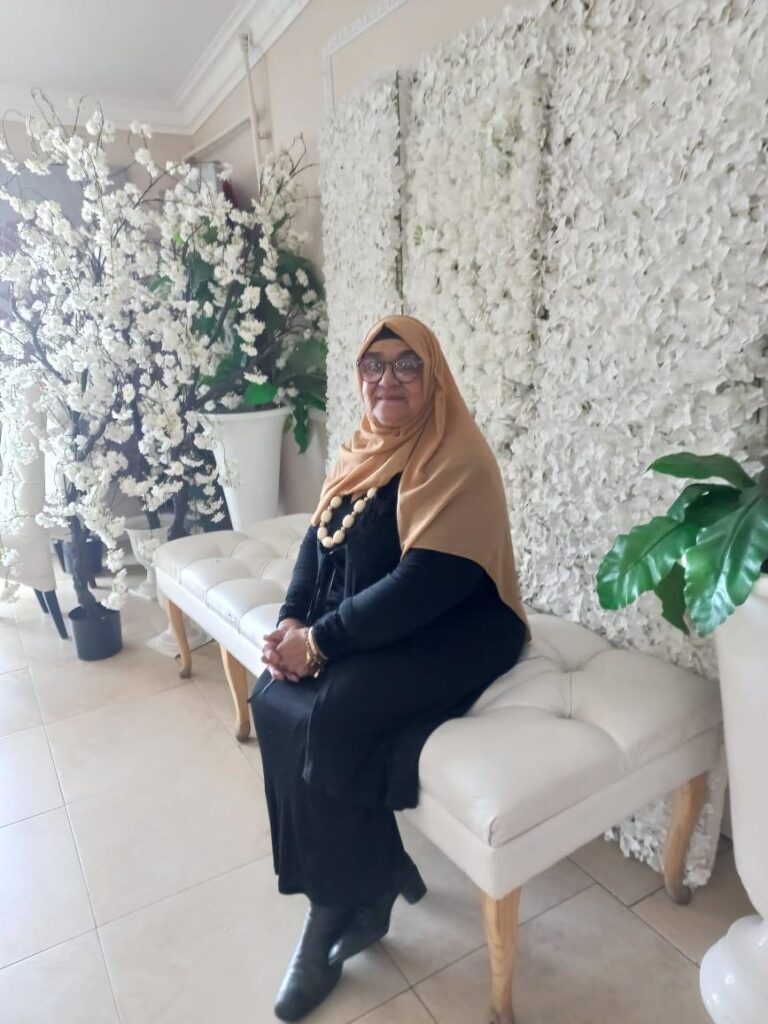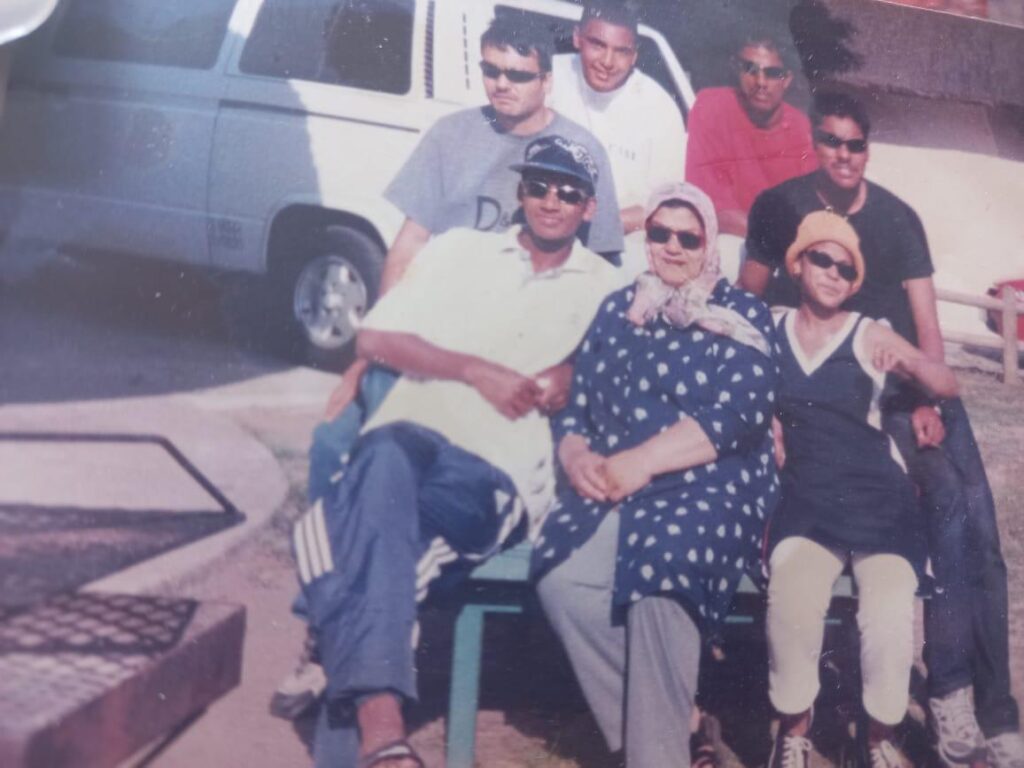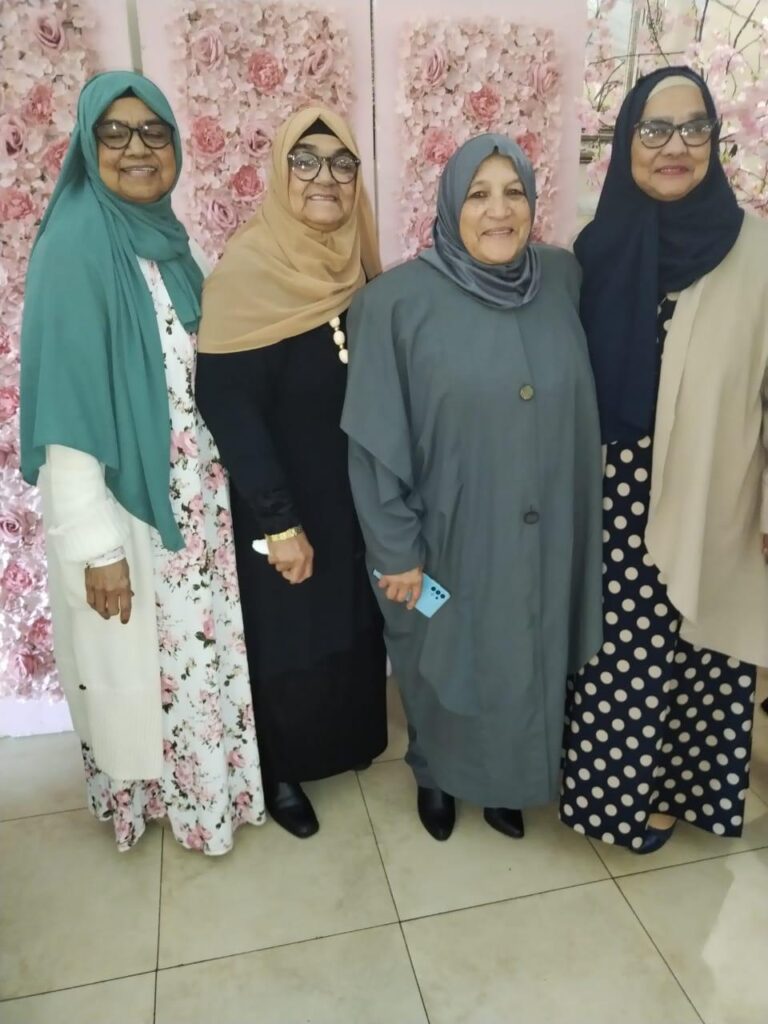Zayda Davids Stemmet
Zayda Davids Stemmet was born to Galima Sonday and Amien Davids on 13 May 1951. Amien Davids parents was Salie Davids (Kim) and Niama Rayloen. Salie (Kim) Davids was Imam at Stegman Road Masjied for a few years. Salie Kim was fluent in Arabic and Urdu, he lived in India and Makkah for 7yrs. Salie Kim came from a musical family, Mareldia Kim recorded Qasidas. Salie’s blind brother played the mandolin and his son Amien played the guitar. Naima Rayloen was from Strand, she was the only daughter and had nine brothers. The Rayloen’s were family of the Wentzels and Karans, they owned fishing boats in Strand. Zayda’s grandparents lived in Fir Street, Claremont and that is where Zayda was born. Zayda’s grandmother taught Urdu and Arabic.
The people of Claremont, mostly married within the area, although top Claremont would call lower Claremont “die vlak” and they would call the people who lived there, sala-bekkies but they were one big inter-married family. Some of the neighbours were Imam Ali (on the cnr of Fir), Te Saraah with Galima and Gakeem, Te Kulsum and Asma, Te Kulsum and Dulla,, Aunty Doreen Jacobs, Cintie, Mrs Master, Uncle Pikkie Johnston and Boeta Hoti (he moved to Manenberg), Moeta Leega, Juffrou Galant, Faiza en Fatima
Galima and Amien had thirteen children and Galima couldn’t manage on her own, so Amien’s parents helped her with the children. When Galima had the twins, her sister in Steenberg looked after her daughter, Doulat to help her. Zayda’s siblings were Mog Saaid, Labiba, Yasmina, Razak, Doulla, Mareldia & Fatima(twins), Benjamien, Zainab, Aneesa, Mariam, Aima en Shaheed. Zayda and her sisters are still close, they meet every Wednesday. This is the result of Galima keeping them together, she would have them all over on a Saturday and if there were any sibling disagreements she would put it to a stop to it, by making them apologise to each other. Galima was a kind person, when she died the poor vagrants brought lilies because she always made them sandwiches. When Zayda was younger her family struggled financially, Amien father would sometimes bring workers home with him. Galima would dish food for everyone from the pot but she would sacrifice and eat a slice of bread.
Zayda remembers how they bathed, the bath would be brought into the kitchen, close to the coal stove, the metal pail with the wooden handles would be used to fill the bath from water boiling on the stove top. Each one would get a turn to wash, using a metal scoop to rinse. Zayda’s sister worked for J Truform and she would bring home off cut fabrics, Galima would buy elastic from Mr Levy in Protea Street, and make them underwear. There weren’t sanitary pads back then, Galima would sew cloth to use as sanitary pads, which was bleached to keep white. They grew up poor but it instilled patience and gratitude.
Their property was two plots and Zayda’s aunt lived next door in the two-bedroom house and they lived in the bigger house. In Zayda’s bedroom which she shared with siblings, they would stack the mattresses above each other and cover it with a pretty bedspread during the daytime. They had a wardrobe with two big doors, each child was allocated a shelf. Galima never gave hidings, she gave messages sometimes without words, if she saw an untidy shelf, she would throw everything out and the child would get the message, keep it tidy! On Saturdays, the children would polish the floors, including the stoep.
Galima was very humble and she encouraged her children to be tolerant. When Zayda got married, she told Zayda that she was going to be living with her in-laws; be humble, be tolerant and rather withdraw than exchange words. Zayda took heed of the advice and lived with her in-laws contently for 53yrs.
Zayda attended Tafala Primary which was around the corner, then she went to Stephen Reagan until Std 5. She attended madrassa with the neighbour, Hatta Leega Galant (Aape). Hatta Leega was Aunty A (Aysa) Galant Abrahams’ older sister. Hatta Leega was very precise and very strict, they couln’t fool around in her class. Zayda’s cousins, Samga, Foora,Niesa and Layla went to madrassa with her. After this, Zayda attended madrassa with her father’s cousins, Imam Ebrahim Sep Davids and his brother, Boeta Saleem. Boeta Saleem would put her in the falakah when she was naughty and she would cry, but she learnt discipline.
Zayda started working at age 14 in Long Street in Cape Town with her sister-in-law assisting with tailoring. Then Zayda’s other sister-in-law got her a job in Ndabeni as a machinist. Zayda was efficient because of this she was made a sample hand, she worked only on sample clothing. Zayda then moved to Pleating Services in Lansdowne and while working there at 19yrs old, she got married to Ismail (Mailie) Stemmet. Zayda’s husband, Ismail Stemmet was from Lower Claremont, which is now called Harfield. Ismail’s father was known for the beautiful cars that he owned. The Stemmets were well off, they had a phone in their home when there were only phones at the corner shop. Ismail Stemmets’ maternal was Hatta Siera that lived in Second Avenue.
Zayda moved in with her in-laws at 26 Hanbury Avenue. They lived there for two years and she had her first two children, Amien and Ardiel. In 1970 they moved, after Zayda’s father in-law bought a big farm house in Penlyn where Zayda still resides today. She continued working and her mother-in-law looked after the boys. Three years later she had Mogammat, four years later she had Faizel, five years later Ayesha and eight years later she had her last child, Nur. At the beginning it was challenging for Zayda living with her in-laws but she adjusted, she would tidy and clean up her space before she left to work in the morning. Zayda’s husband bought her a car, a Capri.
Zayda’s brothers paid for Galima to go to hajj, but Galima was older and needed a companion. Zayda’ husband, Ismail told her he would pay for her to go hajj, so at 28yrs old in 1980, Zayda went to hajj. The cost was R5000 and they were gone for four months and 10 days
Zayda’s childhood home was demolished, the current location is in the middle of Pick ‘n Pay, Montclare, Claremont. “Die apartheid het gekom en almal vir ons weg gesleep vir n olap en n uie”. Amien did not want to move to Manenberg. Amien played guitar in a restaurant in the evenings and entertained white patrons, his boss was Mrs Rossi. Mrs Rossi helped Amien buy their new home at 134 Ottery Road, Wynberg in 1967. Amien worked as a painter for Gordon Verwood, he died suddenly, after he had a pain over his heart, at age, 49. Amien didn’t like to go to doctors, he preferred using herbs to treat his ailments.
Zayda’s family received restitution of R17 000 for two houses which was peanuts. But for Zayda it has nothing to do with money, “It’s sentimental, my darling”. People lived without money but they were happy. They were forcibly removed and some people could not afford to buy homes in good areas and the ended up in places like Manenberg. Zayda’s sister lived in Moray Court in Manenberg and another sister in Elsies River and another in Athlone. They broke up families that lived together for decades, her mother lived in one area and siblings in various other areas, they had to get on trains and buses to get together as a family. The apartheid government did the same here as they are currently doing to the Palestinians.
Zayda lost her sister in law, Sierie, then her son, Amien and then her husband, Mailie. After which she had COVID and it has been a difficult time for her. She lived with her sister-in-law for 53yrs and she was a sister not a sister-in-law. Her children have been very supportive and she wants for nothing but she doesn’t have her husband. They went everywhere together, whatever he bought to eat, he would come home and share it with Zayda and put the first piece in her mouth. They had their fights “ons het geskel, moenie daai weg gooi nie” but later they would reconcile. Zayda fondly remembers that Ismail never said the words “I’m sorry” after an argument, he would come behind her and kiss her in her neck, that was his “I’m sorry”.



